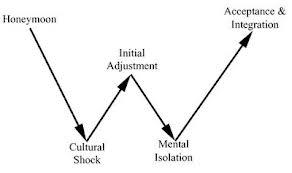The Highs and Lows of Studying Abroad
Jun 16,2015
Studying abroad is a wonderful opportunity to immerse yourself in the culture of another country. You get to meet new people, explore new places, and taste new things. When your friends come home from their trips, you hear all these wonderful stories about their time. What no will tell is that there are going to be low points in your travels, and they can hit you like a truck. The good news is that these lows will pass, and you’ll feel new sparks of happiness soon enough.
Last semester, I took a class all about intercultural communication. It was an interesting class to say the least; I learned all about the troubles that surround visiting, studying, or living among different cultures. The one topic my professor taught the class that resonated with me the most was the W model. It’s a model that outlines the different highs and lows you will feel when visiting, studying, or living in a country foreign to you.
The W Model contains five general peaks and troughs that you will experience throughout the course of your time abroad (no worries, though. There are more highs than lows). They are shown in the photo above, and although these peaks and troughs seem a little scary, they can be little things that you don’t even notice.
Point 1: Honeymoon
You’ve heard of the honeymoon phase for couples: a mixture of elation, curiosity, and excitement. Well, the same holds true for being abroad: packing your suitcase, sitting on that (uncomfortable) plan, seeing your destination as a speck below you all contribute to that giddiness you feel in the pit of your stomach. You can’t believe you actually get to call London/Paris/Milan your home for the next few months. It’s amazing and overwhelming at the same time.
Point 2: Cultural Shock
This low can come as soon as you get off the plane, or it can come after you’ve spent some time in your host country. The French say bonjour to everyone, the Greeks live off a diet of Mediterranean seafood, and the Brits have a dry sense of humor. The weight of the difference can bear down on you pretty harshly, but cultural shock is all about your perception of your new home; if you let the difference of the culture bring you down, you’re more likely to feel this low with much more intensity. If you take a more open perspective and embrace the cultural differences, you can get through this pretty easily. Make sure you always keep an open mind, and this low won’t keep you for too long.
Point 3: Initial Adjustment
This second high comes after you’ve spent some time in your host country and are now acclimated to the culture. You know that commercial for AirBnB where the girl says, ‘Today a city I’ve never been to felt like home’? That’s what the initial adjustment stage feels like. It’s the same as the first time at college you truly identified yourself as a Mountaineer/Panther/Tiger/Buckeye. You feel like you are a member of a culture you only dreamed about before then. This is probably my favorite feeling during the trip.
Point 4: Mental Isolation
This low is an iffy one because it doesn’t happen to everyone. Some people adjust to a culture and only experience little bouts of sadness from homesickness or other minor details. Some feel very isolated in their host country. You may feel like no one understands you, that no one knows what you are dealing with, or that you may feel like you’re the only one going through these emotions. The most important thing to remember at this point is that you aren’t the only one! I’ll say it again: you are not the only one in a city of millions that feels homesick/tired/ostracized. There is someone, somewhere that feels this way.
The best part about staying in another country is that you can connect with other US citizens from across the nation in a completely new setting. If you’re traveling through your university, chances are you traveled with a group. Get together with one of your fellow students and tell him or her about how you are feeling. They may be able to help you. If you’re alone, try and find another American (I promise there is at least one other American in your area). Connecting with someone who feels familiar, who feels like home can be comforting and help you through this low point.
Point 5: Acceptance & Integration
This may not be your final step in your travels, but it’s the final step for this model. This is what I like to call your aha moment. This is the time when you see the differences between you and your culture and the culture of your host country and accept that you may never fully feel acclimated to them. There will times where you feel like you are a regular ole Frenchman/Greek/Brit, but then there will be times where you couldn’t feel more different. At this point you’ve basically integrated into your host country, but there are still small bouts of culture shock at times.
It’s important to remember that you may go through these points multiple times throughout your journey, but the lows do pass. If you ever feel uncomfortable or sad throughout your trip, remember that there is always someone to talk to. Talk to anyone you can; talk to me, I’ll be more than happy to help you. Safe travels, everyone!
(Feature photo from Globe Trotter Blog Spot)






